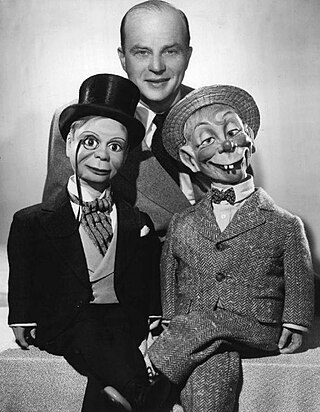
Edgar John Bergen was an American ventriloquist, actor, comedian, vaudevillian and radio performer. He was best known for his characters Charlie McCarthy and Mortimer Snerd. Bergen pioneered modern-day ventriloquism and has been described by puppetry organization UNIMA as the “quintessential ventriloquist of the 20th century”. He was the father of actress Candice Bergen.
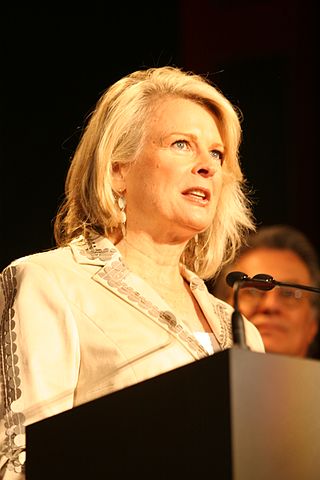
Candice Patricia Bergen is an American actress. She won five Primetime Emmy Awards and two Golden Globe Awards for her portrayal of the title character on the CBS sitcom Murphy Brown. She is also known for her role as Shirley Schmidt on the ABC drama Boston Legal (2005–2008). In films, Bergen was nominated for the Academy Award for Best Supporting Actress for Starting Over (1979), and for the BAFTA Award for Best Actress in a Supporting Role for Gandhi (1982).
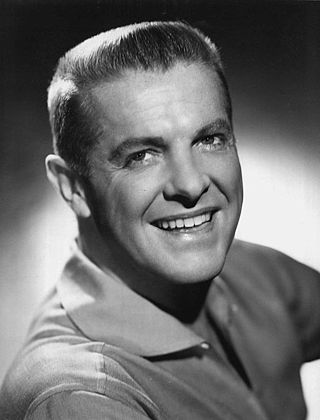
Charles Clarence Robert Orville Cummings was an American film and television actor who appeared in roles in comedy films such as The Devil and Miss Jones (1941) and Princess O'Rourke (1943), and in dramatic films, especially two of Alfred Hitchcock's thrillers, Saboteur (1942) and Dial M for Murder (1954). He received five Primetime Emmy Award nominations, and won the Primetime Emmy Award for Best Actor in a Single Performance in 1955. On February 8, 1960, he received two stars on the Hollywood Walk of Fame for his contributions to the motion picture and television industries, at 6816 Hollywood Boulevard and 1718 Vine Street. He used the stage name Robert Cummings from mid-1935 until the end of 1954 and was credited as Bob Cummings from 1955 until his death.

The Devil and Miss Jones is a 1941 American comedy film directed by Sam Wood and starring Jean Arthur, Robert Cummings, and Charles Coburn. Its plot follows a department store tycoon who goes undercover in one of his Manhattan shops to ferret union organizers, but instead becomes involved in the employees' personal lives.
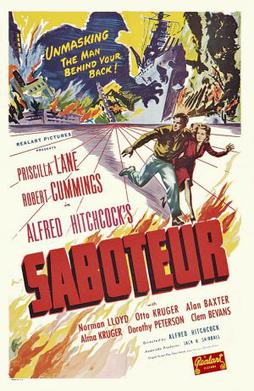
Saboteur is a 1942 American spy thriller film directed by Alfred Hitchcock with a screenplay written by Peter Viertel, Joan Harrison and Dorothy Parker. The film stars Robert Cummings, Priscilla Lane and Norman Lloyd.

John Beach Litel was an American film and television actor.
One Night in the Tropics is a 1940 comedy film which was the film debut of Abbott and Costello. They are listed as supporting actors but have major exposure with five of their classic routines, including an abbreviated version of "Who's on First?" Their work earned them a two-picture deal with Universal, and their next film, Buck Privates, made them bona fide stars. Songs in the film were by Jerome Kern with lyrics by Dorothy Fields.

You Can't Cheat an Honest Man is a 1939 American comedy film directed by George Marshall and Edward F. Cline and starring W. C. Fields. Fields also wrote the story on which the film is based under the name Charles Bogle.

Private Affairs is a 1940 comedy film starring Nancy Kelly, with a supporting cast including Hugh Herbert, Roland Young, and Robert Cummings. The film was directed by Albert S. Rogell.

Three Smart Girls Grow Up is a 1939 American musical comedy film directed by Henry Koster, written by Felix Jackson and Bruce Manning, and starring Deanna Durbin, Nan Grey, and Helen Parrish. Durbin and Grey reprise their roles from Three Smart Girls, and Parrish replaces Barbara Read in the role of the middle sister. Durbin would reprise her role once more in Hers to Hold.
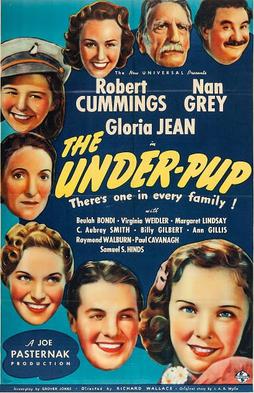
The Under-Pup is a 1939 American feature film by Richard Wallace that introduced soprano singing star Gloria Jean to the screen.

It Started with Eve is a 1941 American musical romantic comedy film directed by Henry Koster and starring Deanna Durbin, Robert Cummings, and Charles Laughton. The film received an Oscar nomination for Best Original Music Score. The film is considered by some critics to be Durbin's best film, and the last in which she worked with the producer and director who groomed her for stardom. It Started with Eve was remade in 1964 as I'd Rather Be Rich.

Spring Parade is a 1940 American musical comedy film directed by Henry Koster and starring Deanna Durbin. It is a remake of the 1934 film.

Look Who's Laughing is a 1941 film from RKO Radio Pictures. The film is built around a number of radio stars from the Golden Age of Radio and centers around radio personality Jim Jordan as Fibber McGee from the comic duo, Fibber McGee and Molly, who plans to build an aircraft factory in a small town. Look Who's Laughing was followed by Here We Go Again (1942), with many of the radio stars reprising their performances.

And One Was Beautiful is a 1940 American romantic drama film directed by Robert B. Sinclair and starring Robert Cummings, Laraine Day, and Jean Muir. It is based on the story of the same name by Alice Duer Miller. Two sisters are attracted to a rich playboy. One runs over and kills a man, and lets the playboy take the blame.

Free and Easy is a 1941 film directed by George Sidney, and starring Robert Cummings and Ruth Hussey. The film is a remake of MGM's But the Flesh Is Weak (1932) with Robert Montgomery and C. Aubrey Smith as the son-and-father team.

Granville Bates was an American character actor and bit player, appearing in over ninety films.
Everything Happens at Night is a 1939 American drama-comedy film starring Sonja Henie, Ray Milland and Robert Cummings.

Rio is a 1939 American crime film directed by John Brahm and starring Basil Rathbone and Victor McLaglen.

Charlie McCarthy is Edgar Bergen's famed ventriloquist dummy partner. Charlie was part of Bergen's act as early as high school, and by 1930, was attired in his famous top hat, tuxedo, and monocle. The character was so well known that his popularity exceeded that of his performer, Bergen.


















